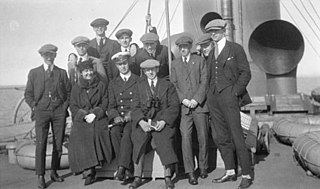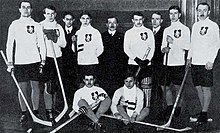
The Ice Hockey World Championships are an annual international men's ice hockey tournament organized by the International Ice Hockey Federation (IIHF). First officially held at the 1920 Summer Olympics. The IIHF was created in 1908 while the European Championships, the precursor to the World Championships, were first held in 1910. The tournament held at the 1920 Summer Olympics is recognized as the first Ice Hockey World Championship. From 1920 to 1968, the Olympic hockey tournament was also considered the World Championship for that year.
The men's ice hockey tournament at the 1948 Winter Olympics in St. Moritz, Switzerland, was the sixth Olympic Championship, also served as the 15th World Championships and the 26th European Championships. Canada won its fifth Olympic gold medal and 12th World Championship, represented by the Ottawa RCAF Flyers team of Canadian Armed Forces personnel. The highest-finishing European team Czechoslovakia, won the silver medal and its eighth European Championship. Bibi Torriani played for Switzerland which won the bronze medal, and became the first ice hockey player to recite the Olympic Oath on behalf of all athletes.

The men's ice hockey tournament at the 1924 Winter Olympics in Chamonix, France, was the second Olympic Championship, also serving as the second World Championships. The competition was held from Monday, January 28, 1924, to Sunday, February 3, 1924. Canada, represented by the Toronto Granites, defended its championship from the 1920 Summer Olympics. The United States and Great Britain took the silver and bronze respectively, while other contenders included Czechoslovakia, France, and Sweden.

The men's ice hockey tournament at the 1936 Winter Olympics in Garmisch-Partenkirchen, Germany, was the fifth Olympic Championship, also serving as the tenth World Championships and the 21st European Championships.

Ice hockey was introduced to the Olympic Games at the 1920 Summer Olympics in Antwerp. The tournament also served as the first World Championships. The matches were played between April 23 and April 29, 1920. Canada, represented by the Winnipeg Falcons, won the gold medal. The silver went to the United States and Czechoslovakia took the bronze.

The men's ice hockey tournament at the 1956 Winter Olympics in Cortina d'Ampezzo, Italy, was the eighth Olympic Championship, also serving as the 23rd World Championships and the 34th European Championships. The tournament was held at the Olympic Ice Stadium and the Apollonio Stadium.

Ice hockey tournaments have been staged at the Olympic Games since 1920. The men's tournament was introduced at the 1920 Summer Olympics and was transferred permanently to the Winter Olympic Games program in 1924, in France. The women's tournament was first held at the 1998 Winter Olympics.

The Czechoslovakia men's national ice hockey team was the national ice hockey team of Czechoslovakia, and competed from 1920 until 1992. The successor to the Bohemia national ice hockey team, which was a European power prior to World War I, the Czechoslovak national team first appeared at the 1920 Summer Olympics, two years after the creation of the state. In the 1940s, they established themselves as the best team in Europe, becoming the first team from the continent to win two World Championships. After the arrival of the Soviet Union on the international hockey scene in the 1950s, the Czechoslovaks regularly fought Sweden and Canada for silver and bronze medals, and sometimes beat the Soviets. In total, they won the gold medal six times.

The Great Britain men's national ice hockey team is the national ice hockey team that represents the United Kingdom. A founding member of the International Ice Hockey Federation (IIHF) in 1908, the team is controlled by Ice Hockey UK.

Vladimír Růžička is a Czech ice hockey coach and former professional player. Růžička was twice named the top player in the Czechoslovak Elite League, and was on the gold medal team in the Ice Hockey World Championship in 1985 and 1998 Olympic Games. He also played 233 games in the National Hockey League (NHL). Since 2008, Růžička has been the head coach of both HC Slavia Praha and the Czech national ice hockey team.
Ice hockey in Germany is one of the more popular sports, and ranks behind Handball and football in spectator favour and meaning. Ice hockey is organized today in Germany by the Deutsche Eishockey Liga, the highest professional league, and by the Deutschen Eishockey-Bund ice hockey federation, which is the sport's federation in Germany and a member of the International Ice Hockey Federation.

Paul Loicq was a Belgian lawyer, businessman and ice hockey player, coach, referee and administrator. He played ice hockey for Belgium men's national ice hockey team and won four bronze medals from in 1910 to 1914. He was a leading supporter of the efforts to introduce ice hockey at the Olympic Games, and served on the organizing committee for ice hockey at the 1920 Summer Olympics. After playing in the 1920 Olympics he served as president of the Royal Belgian Ice Hockey Federation from 1920 to 1935, and as president of the Ligue Internationale de Hockey sur Glace (LIHG) from 1922 to 1947, which was later known as the International Ice Hockey Federation (IIHF). During his time as president the LIHG more than doubled its membership and welcomed the first national associations from Asia and Africa, and the LIHG began hosting its annual Ice Hockey World Championships in 1930. He was also an international ice hockey referee from 1924 to 1937 at the Olympic Games, the Ice Hockey World Championships and the Ice Hockey European Championships. He served in the Belgian Army during World War I and World War II, achieved the rank of colonel, and represented Belgium as legal counsel at the Nuremberg trials.
The 1930 Ice Hockey World Championships were held between January 30 and February 10, 1930, in Chamonix, France, Vienna, Austria, and Berlin, Germany. This event was the first world championships independent of hockey at the Olympics.

The Czech Ice Hockey Association, also known by the shortened name Czech Ice Hockey, is the governing body of ice hockey and sledge hockey in Czechia. It is a member of the International Ice Hockey Federation (IIHF) and controls the majority of organized ice hockey in the Czech Republic.
The 1947 Ice Hockey World Championships were the 14th World Championships and 25th European Championship was the first after the Second World War. It was held from 15 to 23 February 1947 at Štvanice Stadium in Prague, Czechoslovakia. Eight teams participated, but the competition was notably missing the reigning world champion, Canada. The world champion was decided for the first time by round robin league play. Czechoslovakia won the world championship for the first time and the European championship for the seventh time. King Gustav V had sent a telegram of congratulations to the Swedish team after beating the Czechoslovaks, but they had barely finished celebrating when they were upset by the Austrians, costing them the gold medal.
The 1950 Ice Hockey World Championships, were the 17th World Championships and 28th European Championships were held from 13 to 22 March 1950 in London, England. Canada, represented by the Edmonton Mercurys, won its 13th World Championship. Highest ranking European team Switzerland finished third, winning its fourth European Championship. Defending World and European champion Czechoslovakia was absent from the tournament.
The 1989 World Junior Ice Hockey Championships was the 13th edition of the Ice Hockey World Junior Championship and was held in Anchorage, Alaska, United States at the Sullivan Arena. The Soviet Union won the gold medal, its eighth, and ultimately final, championship. Sweden won silver, and Czechoslovakia the bronze.
Jacklyn "Jackie" Crumnée Friesen is a Canadian ice hockey coach, currently serving as an assistant coach with the Wisconsin Badgers women's ice hockey program in the Western Collegiate Hockey Association (WCHA) conference of the NCAA Division I. A retired forward, her professional career was played in Switzerland and the Czech Republic.
The Coupe de Chamonix was an international ice hockey tournament held in Chamonix, France, from 1909 to 1914.
The History of the International Ice Hockey Federation which spans over a hundred years, chronicles the evolution of international cooperation in ice hockey. Among major achievements accomplished in that time is the standardization of playing rules and the establishment of tournaments.













